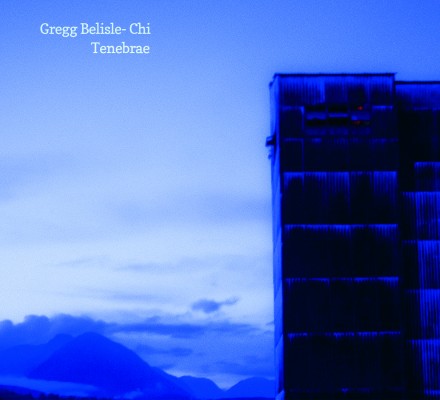Gregg Belisle- Chi
Tenebrae
SGL 1613-2“Gregg has dug deep down into a personal musical zone, transcended his compositional devices, and come back to us with some compelling gems. This is some of the most beautiful music I’ve heard in a long while.”
– Cuong Vu, trumpet player and Chair of Jazz Studies, University of Washington
Being based in Vancouver, Songlines has always had an eye on the Seattle scene. Our second release, Babkas (1993) was a new trio co-led by Brad Shepik, Briggan Krauss and Aaron Alexander, all from Seattle, as were Chris Speed, Jim Black and Andrew D’Angelo of Human Feel, and of course Wayne Horvitz, Robin Holcomb, Bill Frisell, and most recently The Westerlies, whose Andy Clausen introduced me to Gregg Belisle- Chi. Listening to Gregg’s record was a trip. Andy had called it “strikingly beautiful and mysterious.” Hard to categorize, it hovers somewhere between contemporary classical and jazz but transcends those labels through its haunting expressive depth. It also relates to the “alternate” tradition of new music for solo guitar going back to John Fahey, as well as the “avant folk” of artists like Robin Holcomb.
Gregg is 25 and currently completing his M.Mus at UW. This is his first record as a leader, although he has performed with a wide range of musicians in Seattle, among them Jim Knapp, Andy Clausen, Bill Frisell (a friend and mentor), Wayne Horvitz, and Eyvind Kang, and in a variety of genres (avant-garde, pop/rock, folk, chamber). The vocals are by his wife (their musical collaboration began in 2009). As Gregg tells it, “It was two years ago now that I just found myself with an abundance of time and energy to seriously sit down and start composing. At the time I was listening to a lot of Ligeti, Bartok, and other 20th century classical composers, as well as trying to figure out Ben Monder’s sound and his approach to harmony. So, all of those circumstances sort of coalesced into this project; I was just trying to make music that represented where I was at, musically and personally. Guitar is the instrument I know best, and that seemed like a good place to start studying composition. I know its limitations, especially my limitations, and I know how it can be manipulated to create music that might not be familiar to audiences. I’m always trying to convey ‘beauty’ in my compositions, but, simultaneously, I was also paying a lot of attention to harmonic dissonance and investigating how that feels, what kind of emotions it delivers, but I was very conscious about composing clear melodies and trying to make functional sense out of otherwise harmonically dissonant chord progressions.”
The music is through-composed, there is no improvisastion as such. Words and songwriting are a central focus: “For this music I drew a lot of inspiration from writers: when it came to composing, I divided up all the elements similarly to how you might a piece of fiction, in terms of form, phrase, structure, characters, development, motifs. All these things sort of relate to one another, in musical and literary terms. A lot of this music was also influenced by literature: for example, ‘Fear and Trembling’ comes from a philosophical work by Kierkegaard…More and more I’m attracted to the idea of incorporating songwriting into a jazz/improvising ensemble. I think jazz sort of missed the mark by just taking the Great American Songbook and using the chord progressions as vehicles to improvise over; everything is about the instrumental solo and the virtuosity of the players, but that leaves out the listeners who might want to hear a great story or who appreciate great poetry, anyone who’s attracted to words, which seems like a majority of listeners today.”
Two of the songs feature Gregg’s lyrics, while “Sabbaths X (1998)” is a setting of the Wendell Berry poem, which Gregg cites as “one of the most beautiful love letters I’ve ever read. He’s so clear and descriptive without sounding blunt, and he never enters into that realm of sappy sentimentality. I was so moved by it that I thought it would make for a nice piece of music that Chelsea and I could perform together.” As for the album’s title, “In the early stages of composing I was paying a lot of attention to thesmallest details: notes, phrase construction, the ‘architecture’ of the pieces. But I wasn’t paying any attention to shading or color, or light and shadow. Once I started thinking about those things, in terms of harmony and tone, the pieces really started to transform. So ‘tenebrae’, Latin for ‘shadow’, seemed appropriate…My guitar/effects/amplification setup changes a lot, but I will generally use a volume pedal for swells and dynamics, distortion when it is appropriate, minor delay to add a little dimension to the sound, and reverb. All of this runs stereo into two tube amplifiers which I have eq’d a little differently. This gives me a lot more options in post-production to dial in the sound that I have in my head…Recording was done in two days, everything was live. We recorded to analog tape, because I prefer that sound on guitars and also I knew that it would make me commit to takes, rather than having the option to do overdub after overdub.”
